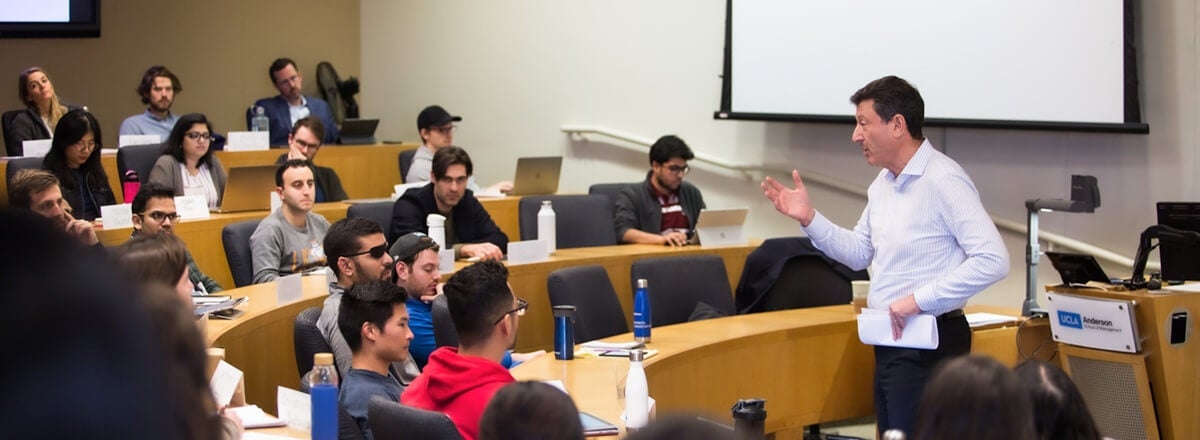Courses
Easton Courses
Technology Management (241A)
Current Topics in Emerging Technologies & Markets (275) including:
- Innovation in Media & Entertainment Technology
- Healthcare Technology
- Product Management – Delivery
- Product Management – Discovery
- Machine Learning & Artificial Intelligence
- Management in the Age of AI
Special Topics in Management (298D)
- Technology & Society: A Dynamic Relationship and The Changing Role of Leaders
Please note: this is not a complete list of elective options for the Tech Management Specialization
Artificial Intelligence (275)
This course aims to prepare students for leading in this emerging era of AI and machine learning. The material focuses on four aspects: the foundational concepts of machine learning, patterns for leveraging AI in business, patterns for managing AI teams and strategy, and trends in the field.
Product Management Discovery (275)
This course provides an introduction to the role of product management as well as practical tools for building products that delight users and build sustainable businesses. While the focus is primarily on how great software products are built within mature tech companies such as Google, Facebook and Amazon, the course will also highlight where differences may exist in startups or smaller company environments.
Product Management Delivery (275)
This course provides an introduction to the role of product management as well as practical tools for building products that delight users and build sustainable businesses. While the focus is primarily on how great software products are built within mature tech companies such as Google, Facebook and Amazon, the course will also highlight where differences may exist in startups or smaller company environments.
Product Management Delivery (275)
This course provides an introduction to the role of product management as well as practical tools for building products that delight users and build sustainable businesses. While the focus is primarily on how great software products are built within mature tech companies such as Google, Facebook and Amazon, the course will also highlight where differences may exist in startups or smaller company environments.
Management in the Age of AI (275)
In almost every sector of the economy AI is playing a transformative role or has the potential to do so. This course will enable managers in all walks of management (general managers, product managers, marketing managers, brand managers, etc.) to make better decisions by understanding AI's impact and identify relevant courses of action. We will study how every managerial discipline: Accounting, Finance, Branding, Marketing, Labor, Leadership, Pricing, and others have to be reinvented and readapted to match the opportunities and challenges posed by AI. We will also study the second order effects of AI on different parts of our society.
In this highly applied course you will learn to think like a general manager in the Age of AI. We will have extensive discussions of real companies and real data scenarios and apply them to different business problems.
Healthcare Technology (275)
The course will address technologies and platforms poised to disrupt the health care industry. Disruptive innovations within the curriculum of this course encompass those that have the potential to fundamentally alter the delivery of health care through improved patient value, increased cost savings and changes in the practice of medicine. Topics covered will include digital health, consumer health care, personalized medicine and diagnostics, genomics and next-generation sequencing, wireless sensing and remote monitoring, virtual and augmented reality, telemedicine, mobile health platforms, electronic medical records and big data.
Technology Management (241A)
Technology and Society (298D)
Technological Innovations in Media and Entertainment (275)
Innovations in technology are impacting the media industry at a rapid pace. Recent advancements have not only disrupted the traditional business models, but they have also created an ecosystem that fosters new forms of media and new processes for consuming it. As media power and preferences continue to shift from corporations to the consumer, content creators are struggling to stay relevant in a continually evolving environment. Technological advancements have forced creators to innovate and alter the way they create, distribute and monetize content today. This class will examine how technology has impacted several key media verticals, including television, social media, gaming, filmmaking, music and short-form content creation.
AI Essentials (275)
Brad Null
This course aims to prepare students for leading in this emerging era of AI and machine learning. The material focuses on four aspects: the foundational concepts of machine learning, patterns for leveraging AI in business, patterns for managing AI teams and strategy, and trends in the field. Classes will be held in person, and time will be spent on lectures, class discussions and guest speakers. There will also be two case studies and a final project.
